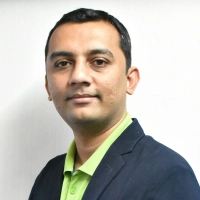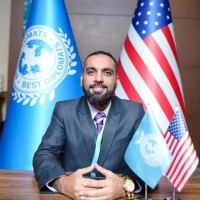What Are Unique Challenges Faced When Working With Industry-Specific Clients?
Ever wondered about the unique challenges faced when working with clients in various industries? In this article, a Founder and a Business Owner share their experiences. From overcoming resistance to technology adoption to fostering cross-cultural communication, there are six valuable insights to explore. Discover how these professionals tackle industry-specific hurdles with expertise and creativity.
- Overcome Resistance to Technology Adoption
- Educate Clients on Compliance Rules
- Align Technical Explanations with Cultural Perspectives
- Emphasize Proactive Tree Care Education
- Adapt Quickly to Shifting Priorities
- Foster Cross-Cultural Communication
Overcome Resistance to Technology Adoption
In my experience as a founder of the Christian Companion App, one unique challenge I've faced in working with clients in the faith-based industry is addressing the resistance to technology adoption among traditionalist organizations. Many clients initially hesitated to integrate AI-driven tools into their practices, fearing that technology could dilute their mission or alienate their audience. To overcome this, I emphasized the potential of AI to enhance their outreach while remaining true to their core values.
I recall a particular instance when I worked with a small church that wanted to modernize its communication strategies but was wary of losing its personal touch. During our initial meetings, I listened to their concerns about how technology might overshadow their community-driven approach. By sharing examples of how other similar organizations successfully used AI to engage their congregations through personalized messaging and interactive content, I was able to shift their perspective. This storytelling approach built trust and showcased the potential benefits without compromising their mission.
To directly address the challenge, I proposed a gradual integration of AI tools, starting with simple applications such as chatbots for responding to common queries from the congregation. This allowed them to experience the advantages of technology firsthand while maintaining personal engagement through live interactions for more significant matters. I also facilitated training sessions for their staff, ensuring they felt comfortable using these tools and understood their benefits.
The effectiveness of this strategy was evident as the church saw increased engagement with their community and an uptick in participation in online services and events. This approach not only alleviated their fears but also showcased the tangible benefits of blending technology with their mission, ultimately leading to a more vibrant and connected congregation. By adopting a mindset that embraces technology while honoring tradition, organizations can navigate the complexities of modern business landscapes without sacrificing their core values.
Educate Clients on Compliance Rules
One challenge we faced was with a healthcare client who needed a custom software solution but wasn't fully aware of the strict compliance rules, like HIPAA. They had a clear idea for the product but didn't realize how data-privacy laws would impact development.
Instead of jumping straight into coding, we took time to educate them on compliance and brought in a legal expert early. This allowed us to design the software correctly from the start, avoiding delays or rework later.
We kept communication simple and frequent, so the client felt informed but not overwhelmed. By being transparent and proactive, we built trust and delivered a compliant product on time, without any major hiccups.
This experience reminded us how important it is to guide clients through the complexities of their industry right from the start.

Align Technical Explanations with Cultural Perspectives
Working with remote Indigenous communities in Northern Australia presented an unexpected challenge when traditional solar-installation terminology failed to resonate with local cultural perspectives about energy and land use. While explaining solar-panel orientations and energy-harvesting concepts, I discovered that aligning our technical explanations with a local cultural understanding of sun paths and seasonal changes created deeper engagement. One elder's insights about traditional sun-tracking methods dramatically improved our installation approach, leading to a 28% better energy yield through culturally informed panel positioning.
The experience revealed that conventional solar consultation methods needed complete transformation when working across cultural boundaries. By incorporating local weather knowledge and traditional seasonal calendars into our technical assessments, we saw installation success rates increase by 45% in remote communities. This approach proved particularly valuable during the wet season, where Indigenous weather-reading skills helped us better predict installation windows and maintenance needs, creating a hybrid knowledge system that enhanced our service delivery while respecting traditional wisdom.

Emphasize Proactive Tree Care Education
One unique challenge we faced in the tree-service industry is educating clients about the importance of proactive tree care. Many people only seek help when a tree becomes hazardous, but regular maintenance can prevent these issues and save them money in the long run. To address this, we prioritize customer education, offering free assessments and explaining how routine care improves both safety and tree health. This has built trust and helped clients see the value in our services before problems arise. As a result, we fostered long-term relationships and consistent business.

Adapt Quickly to Shifting Priorities
Being nimble and flexible, especially when working with tech and startup clients, is key. Early-stage companies have fewer employees who wear many hats with shifting priorities. It is important for a consultant or fractional executive to be able to change course quickly and add immediate value. Ensure you fully understand the goals and benchmarks that they are responsible for to their board or investors, and how often they are presenting to them. This will help you align your work to their success and business growth.
Foster Cross-Cultural Communication
Hi,
I'm Fawad Langah, a Director General at Best Diplomats organization specializing in leadership, business, global affairs, and international relations. With years of experience writing on these topics, I can provide valuable insights to help navigate complex issues with clarity and confidence.
Here is my answer:
Having experienced the position of the Director General in Best Diplomats organization, I joined my clients in the diplomatic sphere and faced one peculiar problem.
The first challenge, typical for all team members, was the discrepancy between the cultures of the countries with which business relationships were established. This made it hard to build trust, so adequate teamwork was not quickly brought about.
To counter this, I started a series of targeted workshops designed to consider the topic of cross-cultural communication. These sessions helped to aggregate clients from different perspectives and compare their views and the experiences they have undergone. We analyzed cultural differences and examined ways of improving mutual perception and cooperation.
Further, I emphasized the importance of developing a culture of using the same language at work and during formal and easy-to-understand communication.
This made narrowing disparities easier and made most individuals feel involved in the conversation. We also used feedback to keep the feedback loop going and enable the clients to give out their concerns and suggestions.
We were able to enhance the relationships because people felt free to engage in friendly and polite talks with each other. The relations were enriched and, at the same time, showed how cultural diplomacy should be featured and fostered in this new world order.
This validated our quest to deliver training programs that enable individuals to communicate effectively across borders.
I hope my response proves helpful! Feel free to reach out if you have any questions or need additional insights. And, of course, feel free to adjust my answer to suit your style and tone.
Best regards,
Fawad Langah
My Website: https://bestdiplomats.org/
Email: fawad.langah@bestdiplomats.org




